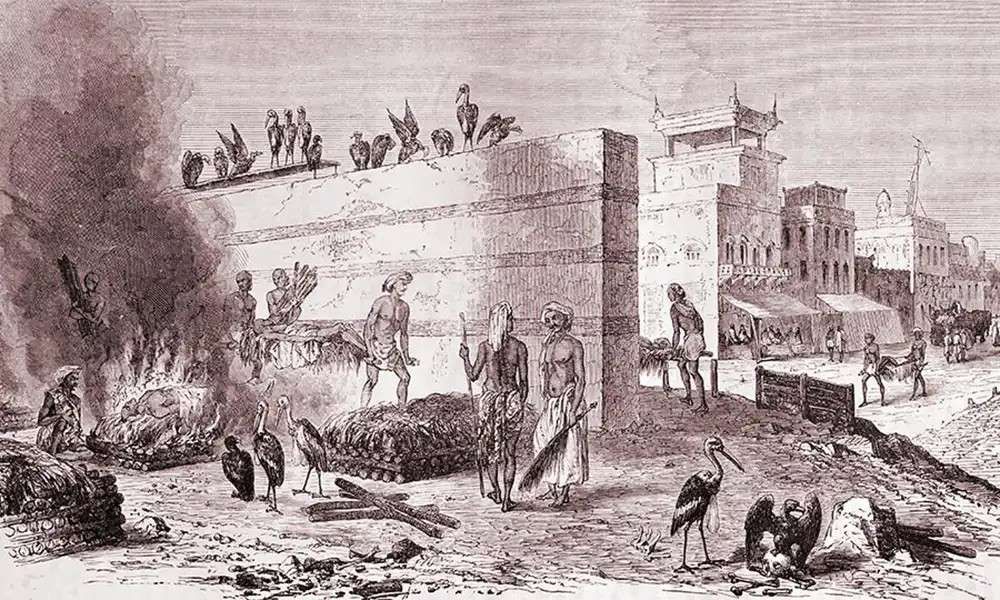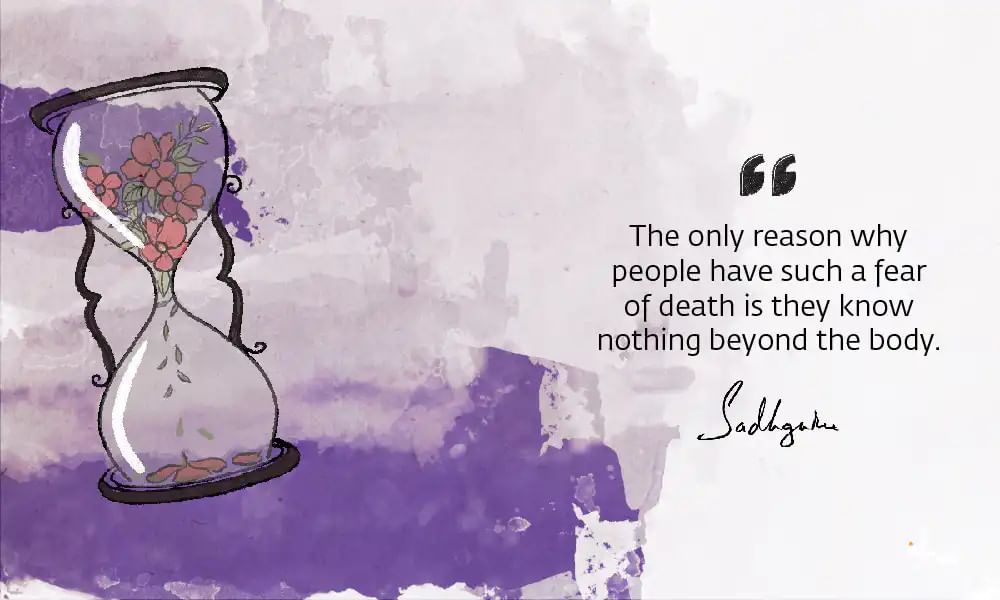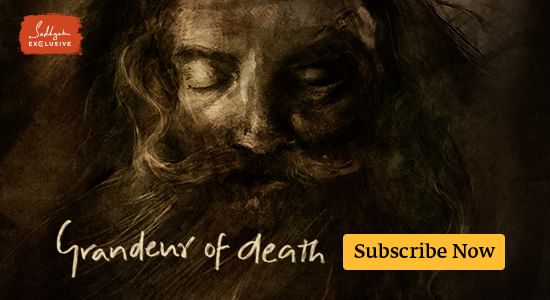The Fear of Death and How to Overcome It
Sadhguru shares a refreshing perspective on a topic that has been seen as a taboo but is vitally relevant in today’s world – Death. He explains how the fear of death arises from not being in touch with reality.


Why Is There a Fear of Death? – An Excerpt from Death: An Inside Story
Sadhguru: In many parts of the world, children are told not to even utter the word “death” inside the house, because they have a stupid hope that if you do not utter this word, it will not enter the house. This morbid fear of death is not natural. Maybe the majority of people have subscribed to it, that is different, but the fear is not a natural process. Death is a natural process. If life happens, then death is natural. Being afraid of something natural is unnatural. The fear of death is simply because we are not in touch with reality. The fear of death has come to us because we have gotten deeply identified with this body. Our identification with this body has become so strong because we have not explored other dimensions. If we had explored other dimensions of experience, if we had established ourselves in other dimensions of experience, the body would not be such a big issue.You talk of your body as if you came with it. You did not. You only gathered it. You gathered it while in your mother’s womb and continued gathering it after your birth. Whatever we accumulate, we can say, “This is mine.” But you cannot say, “This is me.” Now, if I take the cup from which I drink water and say, “This is my cup,” you will think,” Sadhguru seems to have “some problem. But let me listen some more, everyone says he is wise.” But after some time, if I say, “This is me,” then you will definitely say, “Let me get away from this person.” But you are doing the same thing with your body, which is why you make such a big fuss about shedding it. Suppose you overate and gathered a lot of body during the next few weeks and then worked out and dropped some of it, you do not call it death. You gathered something and you put it back. No big deal. You would be happy and relieved, not distressed, about it. It should be the same with death. What you know as death is just a little bit of purging. With age, the flesh is beginning to lose its vigor, so it needs to be cleaned up. Either you put back what you gathered joyfully or you put it back crying. That is a choice you have. Death is like you picked up a spadeful of soil and threw it back. But, instead, if you look at this spadeful of soil and get very attached to it, you will cry like a child when it falls off your spade. It is like a child, who picked up a little pebble from somewhere, came home and lost it. He is heartbroken. He cries inconsolably. If all that you know is just the body, then this is what will happen to you. But if you had known something in your life that is more than the body, then shedding the body will not be a big deal for you.
Death Is Not Sinister
If we look at how we have perceived and portrayed death in India, you will see that death is not seen as sinister. The dark thing about death is the loss for the living. If people lose something precious to them – it could be things; it could be people – they will break down. It is darkness only for the living, but death itself has always been portrayed as a grand event in this culture. It is only now that Indians are imitating the West and walking with heads down when someone dies.
Above all, there are wonderful stories. The legend goes that Shiva has made the Maha Shmashan his earthly abode and is waiting there. Every time someone dies, he dances in celebration. What kind of a pervert is he to dance and celebrate if someone dear to me dies?
Let us look at the fundamental aspects of life. In the experience of most human beings, life is just their body, their thoughts, and their emotions. If we pay some attention to the nature of our lives, we can clearly see that both the body and the mind are accumulations. Beyond these accumulations, there is life.
The Soap Bubble
To use an analogy – when you were a child and you blew a soap bubble, the bubble was real, but what was inside the bubble was just the same atmosphere that is all over. When the bubble burst, a drop of soap water fell on the floor, but where the content of the bubble went, you could never see, because it is part of everything.
This is the nature of life. The whole cosmos is a living mass of life. When the bubble burst and this air or this life that was trapped in the bubble got released, what is happening on the other side is way bigger than what can happen within the trap of physicality. Shiva is laughing, singing, and dancing because one life got released from the mortal coil.
Fear of Death – A Social Conditioning

Prasoon Joshi: Once, there was a death in the family and I went there. There was a kid playing and he happened to go over the dead body, as if it was a thing lying there. People pulled him away, but the child did not register why. Is fear of death a conditioned process? Is it inculcated into us that we should perceive the fact that someone is gone as such a big event or a calamity?
Sadhguru: Seeing death as a tragedy is physically, mentally, emotionally, and socially a reality, not an existential one. A child is an offspring of life - he is not yet a slave of social conditioning. He would even play with the dead; it would not matter. But because adults feel this is inappropriate, they will try to condition the child. When someone very dear to them dies, most people actually feel as if this is the end of the world. But after some time, they will come around.
Children do not have this time-lag – they come around quickly, because they are less influenced by what is happening in society. How society handles death has a purely mental and emotional basis, which means, it is our making – we could make it whichever way we want. Maybe the so-called educated people have given it up, but otherwise, if someone dies in this land, they will beat the drum and have a party. I am not trying to belittle the loss that a person goes through. But all mental factors – your thoughts, your emotions, your social opinions and situations – are only relevant to a certain extent. Existentially, what you think, what you feel, what your society thinks, is absolutely irrelevant. That is why we always position Shiva, one who we consider as the highest, on the edge of society. He is always on the cremation ground.
This Mortal Coil
This is how every yogi starts his life. From the age of eight to seventeen, I spent an enormous amount of time in the cremation ground - it simply intrigued me. I would just sit there. People would come and set fire to the body. You know, firewood is expensive, so some people want to save on the wood. I do not know if any of you witnessed this - when the body gets cremated, the first thing that burns up is the neck, and unless they made the wood arrangement very large, invariably, the halfway burnt skull rolls off. This happens after three-and-a-half to four hours. By that time, no relative is there - they are all gone within one or two hours. I would pick up the skulls and put them back on the pyre.
Everyone talked about so many things - I wanted to see it myself. I spent days and nights in the cremation ground, not even knowing why. Today, we send those who are seriously on the path to the cremation ground to spend a certain amount of time there, because mortality has to sink into you. You must understand the essential nature of your life. Only when you realize you are mortal, the longing to know that which is beyond will arise.
Death as a Doorway to Enlightenment
Definitely, the last moment’s quality will become a major quality of your future lives – if you wish to have future lives. If you want dissolution into the Ultimate, if you want to become one with it, then there is no future life. If you can maintain your awareness in the moment you are shifting from one dimension of life to another, from the physical to the beyond, that is mukti, or liberation. You can attain. People have been telling me, “We are going to dissolve and become nothing? Sadhguru, don’t use this negative terminology – it scares us.” Instead we could say, “When you attain mukti, you will become everything.”
The body is a loan you took from Mother Earth. If you have made this into a blessed life, if you really put it to absolute use and you lived in great sweetness within yourself, then, when Mother Earth says it is time to pay back the loan, you will joyfully pay it back. And there is no interest. For one who joyfully pays back the loan, it is over, because when you are joyful, being aware comes naturally. When you are aware, you are on the path of liberation.

Subscribe


